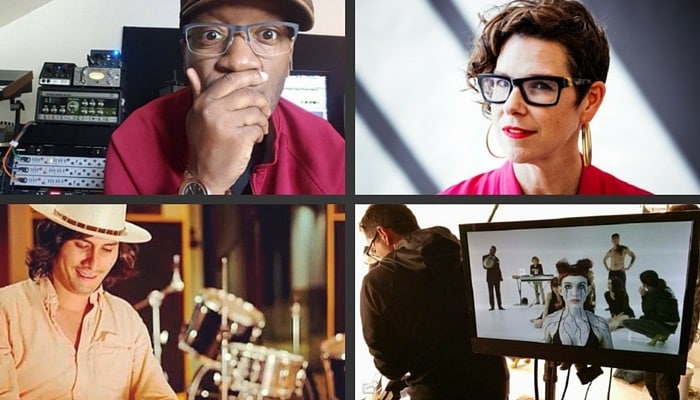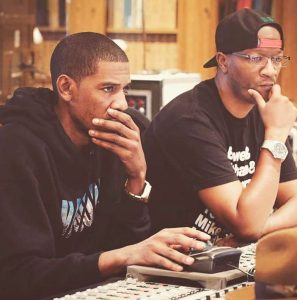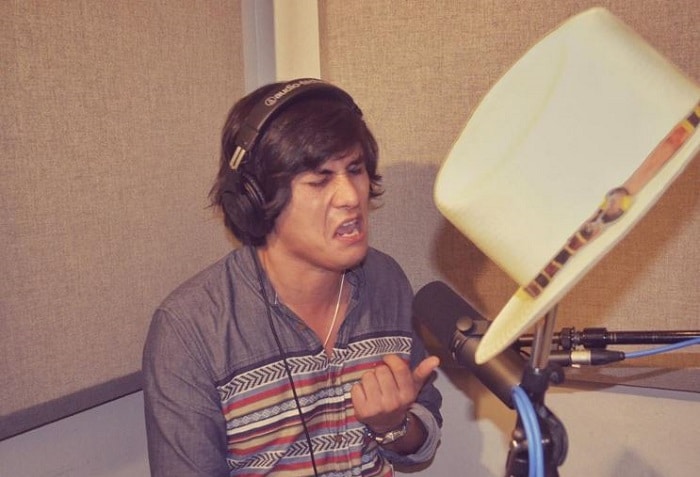
Check out advice from four professional Austin music makers on how to be successful in Austin
Guest article by Ben Snyder
The low cost of living used to attract musicians here. Austin’s small town feel, combined with its thriving economy, drew talent away from New York and Los Angeles, simply because the rent was cheaper. But that’s not the case anymore. It’s getting harder and harder to make a living as a musician in Austin.
Below, you’ll learn about four Austin musicians who are adapting in order to achieve the holy grail of getting paid and preserving creative autonomy in our rapidly growing city.
#1 Terrany Johnson, a.k.a. “Tee Double”
Artists who think beyond gigging have been able to weather the storm over time, and there is no better example of this than local hip-hop artist and producer, Terrany Johnson. He’s a survivalist, driven by quality and building a solid reputation.
But let’s get one thing straight: Johnson is absolutely money-motivated. He shared several examples of how musicians can monetize their art in Austin, based off his 20 years of experience in the industry. When it comes to the subject of whether Austin musicians can afford to be in Austin today, Johnson says artists need to stop relying on the city to solve their problems, and start looking for creative revenue streams to make enough money to pay the rent.
Here’s his advice:
- When negotiating, own your masters.
- Create a catalogue that’s ready to be licensed for television and film.
- Watch for opportunities to monetize your music.
- Diversify what you do.
Speaking of creative revenue streams, Johnson shares a personal story: “I was working for SXSW and noticed that a lot of groups were getting left out. People submit to play SX, pay their fee and don’t get accepted.” So, Johnson figured out a way to make money from this situation by creating a CD, charging artists $500 to be on it, and then passing them out during SXSW. There were 20 songs on his first CD. He created CDs for four years. You do the math.

Terrany Johnson hard at work with Young Guru (Credit: Kinetic Global)
Johnson describes how he got one of his songs on the acclaimed TV series, Breaking Bad: “I had never heard of the show, and I asked a friend if they thought it was a good show. Would it be worth putting music up on? And all my friends told me that I should.” Breaking Bad wanted to buy the rights to Johnson’s song outright, but he pushed for a long-term revenue source and ended up getting a “streaming” deal with Netflix. He says that choice got him at least twice (maybe three times) as much money than he would’ve gotten from selling the master.
Ultimately, it was the relationships Johnson made throughout the years that led to money-making opportunities. In the wake of rising costs of living in Austin, he says artists need to “get back to the basics, and start lighting fires by clinking rocks together again.”
To learn more about Terrany Johnson, click here.
#2 Elizabeth McQueen

Check out Elizabeth McQueen’s podcast, “This Song,” on KUTX (Credit: Courtney Chavanel)
Ten years ago, Elizabeth McQueen was travelling with the band, Asleep at the Wheel. “When I got off the road, I had to figure out what to do,” she explained. So she got a part-time job at KUTX and also started working as a teacher. Last spring, she started a podcast called, “This Song,” where she interviews musicians about songs that have changed their lives. McQueen is also part of a jazz group that plays private parties. Long-story-short: this Austin artist stays busy by diversifying and connecting with other musicians.
“Austin has what we call the ‘Austin Musician Recycling Program,’ where you go and see your friend’s band and they come and see you,” McQueen revealed. That’s how things usually go, unless you have a magical Bob Schnieder or Shakey Graves situation occur, and you can draw an audience consistently.

McQueen with her latest band, EMQ (Credit: Courtney Chavanel)
Magic aside, McQueen is optimistic that Austin won’t let the beloved creative community be pushed out, and will continue to be supported through organizations such as Black Fret. She has a special place in her heart for the prototypical “slacker musician,” and says Austin attracts people who are not motivated by money, which makes for collaborative community. “We [the arts and entertainment community] could do better by being more connected in the different creative industries, such as music, film and comedy.” She hopes this common fight of dealing with rising prices will force creative groups to work together.
McQueen is quick to point out that yes–the city is changing, but the music remains constant. “You fall in love with the Austin of your twenties…You move here and it’s like this friend. It’s like a person. Then you grow up, but you don’t want your cool, music-loving-pot-smoking-hippie friend to grow up! Basically, Austin is growing up.”
To learn more about Elizabeth McQueen, click here.
#3 Julian Acosta

Musicpreneur Julian Acosta recording in the studio (Credit: JulianAcostaMusic.com)
After moving from Mexico to attend The University of Texas at San Antonio, Julian Acosta founded his own record label, Capitol City Records, which was recognized by the Austin Music Industry Awards as one of the Top Ten Local Record Labels. He also performs with his band, The Hustle, at popular venues like Stubb’s, Blackheart and Empire Control Room on a regular basis.
It’s work ethic that pays the bills, this musicpreneur explains: “You have to do work. I mean real work. Work isn’t a job. Work is work. It’s sweat equity that you trade for capital.”
A lot of what Acosta does centers around attracting tourists looking for a taste of the “Live Music Capital of the World.” His affinity for Austin-centric marketing can be best seen with his homage to “Lunch Atop of Skyscraper.” It this promotional image, Acosta is sitting on a beam overlooking the Frost Tower with a pack of Shiner. Where some have parodied the construction in our city as an intrusion, Acosta shows Austin’s growth as a positive, harking back to the growth of New York City in the 1930s.
Acosta and his team’s efforts have been paying off, and he’s excited to be working with major drink sponsors, such as Jim Beam. He’s also developing other musical acts, teaching them to market themselves and have the level of success he has experienced in just a few short years. Specifically, he’s looking for artists who can promote themselves and work hard to gain an audience.
To learn more about Julian Acosta, click here.
#4 Lauren Bruno

Austin is home to many thriving tech companies, and some artists have gravitated towards working at these organizations to establish themselves in the local music scene. For instance, 26-year-old musician, Lauren Bruno, established a great alliance with a booking company, Solstice Live. The organization began as a music festival booking app, which turned into a local booking app. Bruno uses it to book shows and connect up-and-coming musicians to various clubs in Austin, such as Swan Dive, Vulcan Gas Company and The Mohawk.
“It’s the tech platform that has been missing for musicians here in Austin,” says Bruno. “Artists used to rely on a team of people to book for them. But now, more of the power is given to the artist due to technology like Solstice Live.”
In the past year, Bruno estimates she has booked shows for clients every single weekend, and there are no signs of slowing down. The site now has 500 active musicians. She believes it’s her empathy for musicians that brings success at her day job because she understands her clients’ needs.
Bruno’s own band, Les Rav, actually had its own day. And her new band, Slooom, was recently honored for their music video, “Honey,” (directed by Ryan Orenstein) at the first Austin Music Video Festival Awards.
On top of her busy schedule, Bruno felt a calling to connect social issues with the music and arts community. Thus, $3 Shows was born. At her last event, which took place at Swan Dive, $3 Shows raised $805 for musicians and an additional $325 for a young girl named Ingrid, who is battling severe scoliosis.
To learn more about Lauren Bruno, click here.
The Slacker Austinite Musician is evolving into an Austin Music Entrepreneur. Those who can market themselves, work with successful venues and utilize technology to connect with their audience are the ones who will be able to pay rent through full-time music.
@theAustinot wants to know:
In your opinion, who’s the most innovative Austin musician?
Since forming The Show! Austin in 2011, Ben Snyder has produced multiple web series and films, many of which have found success on the festival circuit. He currently writes for several projects for Spiderwood Studios in Austin, including the 1960s comic acquired by Charlton Comics titled “Mercury Man.”
- Best Austin Restaurants With a View – 8 Most Scenic Places to Eat - October 8, 2022
- 7 Best Austin Restaurants With a View: Most Scenic Places to Eat - October 21, 2021
- DipDipDip Tatsu-ya Is Making Austin Go Wild Over Shabu Shabu - January 27, 2020

Useful article. Thank You.
Thank you for your feedback! I learned a lot myself on what resources Austin currently has for musicians.
Bat City Surfers! Great Horror Surf music!
Huh?
Interesting topic. Nicely done.